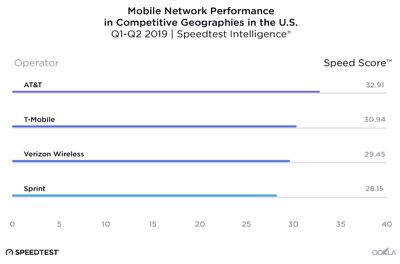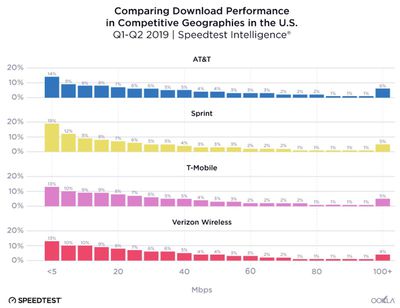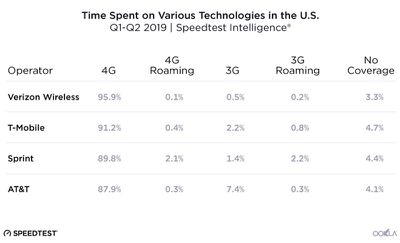Ookla, the company behind the popular Speedtest bandwidth measurement service, today released its 2019 Speedtest Mobile Performance Report, leveraging over 11.5 million speed tests from over 4 million unique devices to rank the network performance of the major U.S. carriers during the first half of 2019.
Overall, Ookla found that the mean mobile download speed rose to 33.88 Mbps during the first half of the year, up 24 percent compared to the same period in 2018. That improvement allowed the U.S. to rise from 43rd to 40th in the global rankings of mobile download performance. Mean upload speeds rose 13 percent to 9.75 Mbps, which actually resulted in a drop of 21 spots to 94th in the global rankings.

Looking at the four major U.S. carriers, AT&T came out on top in this year's survey with a Speed Score (a weighted rating of 90% download and 10% upload speeds) of 32.91, with T-Mobile, Verizon, and Sprint following behind. That marks a significant improvement for AT&T, which placed third in last year's survey.
Delivering LTE service over seven licensed frequency bands and increasing the amount of seeded devices capable of four and five carrier aggregation has been paying off for AT&T. Over the past year, AT&T has managed to leapfrog the competition to produce the fastest download speeds across the country.
AT&T’s addition of FirstNet spectrum meant a required maintenance visit to cell sites and the addition of brand new hardware at those locations. AT&T wisely used this opportunity to also upgrade the existing radio access infrastructure, including replacing the aging Alcatel-Lucent equipment with Nokia in some areas and adding the 2.3 GHz WCS spectrum for additional capacity. This strategy, combined with a slew of Category 15-20 LTE smartphones, meant a tremendous boost in coverage, speeds and overall capacity.
But beyond raw download and upload speeds, Ookla also looked at several other metrics including Acceptable Speed Ratio, which is the percent of samples from a given carrier that measured at least 5 Mbps. By this metric, Verizon maintained its spot atop the rankings from last year, with 87.3 percent of samples meeting the 5 Mbps standard in 2019. T-Mobile and AT&T were fairly close behind at 86.9 percent and 85.9 percent respectively, with Sprint trailing at 81.2 percent.

Verizon also topped the rankings in 4G LTE support, with 95.9 percent of time spent on what is currently the fastest mainstream standard. T-Mobile, Sprint, and AT&T rounded out the rankings, with AT&T users still seeing 7.4 percent of time spent on 3G technology.

Looking ahead toward 5G technology that's just starting to roll out, Ookla has opted not to release performance data at this point due to the very limited geographies where it's available and lack of widespread device support for now, but the company has seen speeds in excess of 2 Gbps in some real-world consumer speed tests.
Ookla has plenty more data on its page dedicated to this year's study, including a state-by-state breakdown where you can see how the major carriers rank on a more localized basis.






















